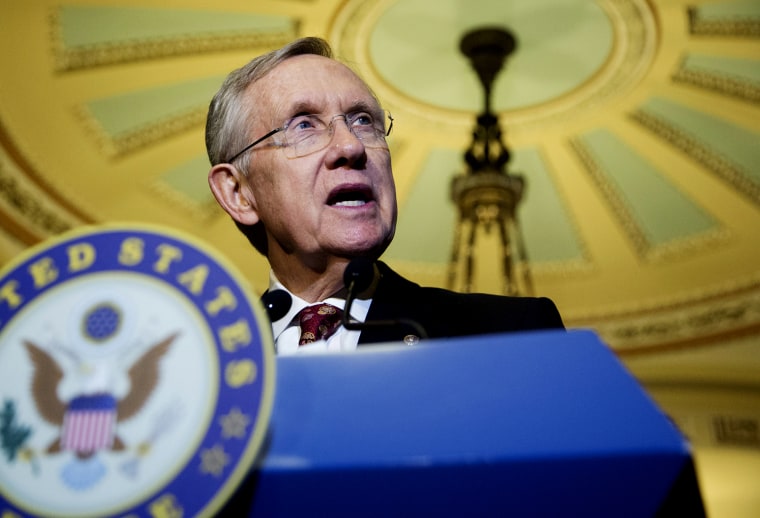In April 2005, when Republican Senate Majority Leader Bill Frist threatened to eliminate use of the filibuster against judicial nominees, there was only one problem. He didn’t go far enough. Now that Democratic Senate Majority Leader Harry Reid has actually carried out Frist’s threat, extending the prohibition to all Senate confirmation votes save those for the Supreme Court, the same drawback pertains: Reid didn’t eliminate the filibuster in every instance. Still, it’s a good start, and there’s every reason to believe the filibuster will soon be a thing of the past. Like the Berlin Wall, it’s not an edifice you can dismantle halfway.
No one can plausibly accuse Reid of acting in haste. The number of Senate cloture votes—a rough proxy for the number of filibusters—has been rising steadily in recent decades, and after Republicans lost the majority in 2006 it more than doubled. If eliminating the filibuster was justifiable in 2005—and it was—it is much more so today.
Granted, the number of cloture votes fell a bit after the 110th Congress (2007-8). But that merely reflected greater caution on the part of the Democratic majority. The number of bills actually passed in the Senate fell from 556 in the 110th Congress to 176 in the 111th (2009-10) and 364 in the 112th (2011-12). By contrast, from 1947 through 1978 the number of bills that passed the Senate in any given two-year session never fell below 1,000. This is what commentators mean when they say that the modern Senate is broken; its ability to pass laws is, by historical standards, greatly diminished, and has been for more than three decades.
For a long time, Reid didn’t want to do anything about this. His previous response to Republican obstructionism was to threaten repeatedly to limit use of the filibuster, only to settle for cosmetic and wholly ineffectual “compromises” with Senate Minority Leader Mitch McConnell. As recently as this past July, Reid proposed eliminating filibusters against all executive-branch nominations but not judicial ones. Now the only members of the judiciary that can still be filibustered are Supreme Court nominees.
Why the change? Reid got fed up when congressional Republicans, after shutting the federal government down and threatening to put the Treasury in default, proceeded to filibuster three consecutive nominations to the D.C. Circuit Court of Appeals. Senate Republicans claim that the D.C. Circuit doesn’t need any more Democrat-nominated judges because it’s “underworked.” But among the many who disagree is the Judicial Conference of the United States, chaired by one John Roberts, chief justice of the United States Supreme Court.
So what happens now? McConnell has threatened that if Reid eliminated the filibuster on nominations, he would, next time Republicans are in the majority, eliminate the filibuster on everything. In principle, there is no reason not to. After all, the case for killing filibusters against judicial nominations is weaker than the case for killing filibusters against legislation, because judicial appointments are for life. You can’t repeal a judge; you can only impeach and convict, something that’s happened only eight times in all of US history. Now that Reid has jettisoned the judicial filibuster, why not eliminate less-justifiable filibusters against legislation, too?
Eliminating Supreme Court filibusters would be more problematic, because a lifetime appointment to the Supreme Court is more consequential than a lifetime appointment to a district or appellate court. But if greasing Supreme Court appointments is the price of getting the Senate back in business, it’s worth paying. (A far better way to limit the damage made by bad Supreme Court appointments, or appointments that become bad when the appointee loses his or her marbles, would be term limits. Anybody up for amending Article III of the Constitution?)
As a practical matter, the wholesale elimination of the filibuster may come well before 2015, when Republicans get their next shot at regaining the Senate. That’s because Reid’s partial elimination of the filibuster could easily provoke Senate Republicans into becoming even more obstructionist. (They don’t need much encouragement.) They might become even more inclined to filibuster legislation. Or they might use “blue slips” more frequently to delay judicial nominations in their own states, or avail themselves of even more obscure parliamentary mechanisms to frustrate the will of the majority. If they did, Reid would have to crack the whip again, and the logical next step would be eliminating all uses of the filibuster.
Would that be the death of a Senate tradition? Yes, but it's not an honorable one. Even in the “good old days” of (less-frequent) “talking filibusters,” when those who wanted to block Senate votes had to speechify themselves hoarse, the filibuster’s most notable targets were bills to outlaw lynching and Jim Crow. The House of Representatives eliminated the filibuster way back in the 19th century, and somehow it managed to survive. A filibuster-less Senate would not only survive, but likely thrive to an extent it hasn’t in four decades. Bring it on.
